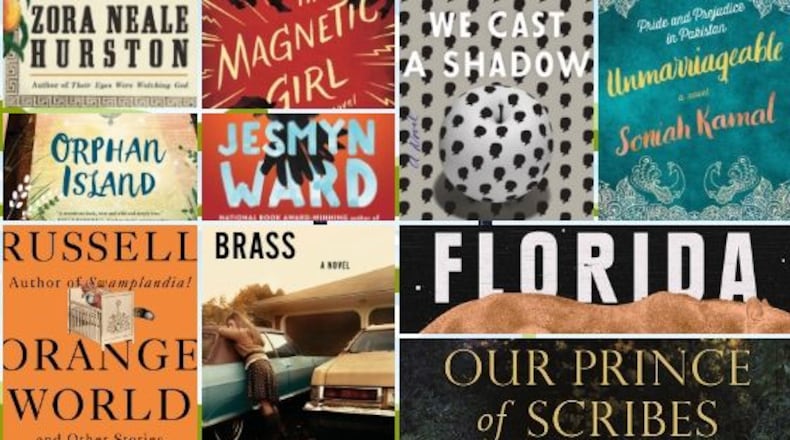Two hours after Sylvie Snow swallowed her first hydrocodone pill, “bubbles of goodwill” coursed through her bloodstream. Normally tired, complacent and resentful, Sylvie’s mood was so dramatically altered that for the first time in years, she was able to speak her stillborn daughter’s name. Standing together in the kitchen, she, her husband Paul and their son Teddy lit a candle for Delilah on the third anniversary of the child’s death.
Fast forward three months, and 46-year-old Sylvie is an addict willing to do almost anything to get more pain pills. What started as a way to give herself a break on a tough morning has escalated into a dangerous dependency that threatens her relationships, reputation and livelihood.
The latest novel from Atlanta author Zoe Fishman, ("Inheriting Edith," "Driving Lessons," "Saving Ruth") frames the nation's devastating opioid crisis through the lens of a grieving, upper-middle-class woman. In "Invisible as Air," as so often happens in real life, the protagonist first gets her hands on the pills when a doctor prescribes them for a minor injury. Sylvie's husband breaks his ankle while on a 25-mile bike ride, and he rebuffs the so-called "hillbilly heroin." Sylvie had seen the addiction shows with people shooting up in their cars and news segments about "entire towns turning into zombie villages on this stuff," but, she reasons, that wouldn't be her.
Given how many of us have battled addictions, lost someone to an overdose or know someone who’s struggling, a trigger warning is offered here: This book may be a tough read for those with drug abuse-related trauma. Same goes for anyone with open wounds regarding the loss of a child, as it’s the unpacking of this tragedy that undergirds everything else.
The chapters rotate between the perspectives of each family member, which affords the reader a look into both what losing an unborn baby may be like for those who didn’t carry the child, and what it’s like to live with someone developing an addiction. Sylvie’s not the only one trying to fill the void with a steady diet of escapism. Paul exchanges flirty texts with a younger woman, is addicted to online shopping and has taken up a triathletic compulsion. Twelve-year-old Teddy, the innocent witness to it all, watches movies on a loop because “there’s always a happy ending.” He’s an aspiring screenwriter whose inner dialogue spins fun fantasies, like one about a baron sent ahead in time to save the world from Donald Trump.
But none compare to Sylvie’s vice. “The medicine flowed through her veins in a river of pink wine, undoing all the knots in her neck like a zipper, pulling the tab down as blue and yellow songbirds flew out.” Paul and Teddy notice Sylvie’s different demeanor right away, but are so grateful for her personality change, they initially don’t question it.
Sylvie plans to quit after the bottle is empty, but then justifies getting a refill by saying she’ll stop once Teddy’s dreaded bar mitzvah is over. Alas, when the refill runs out, she finds truly selfish and deplorable ways to get more. “The day before had been a bottom, although Sylvie realized with a fair amount of shame that every time she reached her supposed bottom, she allowed herself even a few more thousand feet to fall.” Sylvie’s unlikability as a character is high, but sympathy for the cause of her pain keeps it from going off the charts.
While the novel demonstrates the ways drugs can irreversibly damage a life, it reads less like a D.A.R.E campaign than a cautionary tale against carrying the burden of tragedy alone. Sylvie’s unexplored psychological wreckage led to the drug abuse, a self-destruction that had been a long time coming, “because wishing that things had turned out differently never went away. Even with these pills, that wishing never went away, as evidenced by the fact that here she was, in a 4-year-old girl’s bedroom, clutching a stuffed ostrich and sobbing.”
As Teddy takes in the world around him, he considers the possibilities of different story arcs. The momentum in his own story builds when he runs away to Cumberland Island, the place where his childhood really ended, long before his impending bar mitzvah is set to mark his foray into manhood. As the tension between Sylvie and Paul reaches a breaking point, Teddy and his girlfriend Krystal assume parental roles with a level of maturity that surpasses their ages. It’s unclear if Teddy would categorize the ending as “happy,” the way he prefers movies, but the secrets that are forced to light offer potential for his family to finally start healing.
In the acknowledgments, Fishman states that between the start of writing “Invisible as Air” and the final stages of copyediting, both her husband and her father died. The mother of two sons credits her support system for being able to finish the book. Persisting through unimaginable grief, Fishman has succeeded in publishing a deeply substantive novel that, despite being filled with heartbreaking moments, manages to impart with the reader a sense of connection and resilience. Her writing creeps up on you, like a crescent moon that seems to mysteriously switch sides in the night sky during a drive down a winding highway — taunting, unsettling, beautiful.
FICTION
By Zoe Fishman
William Morrow
416 pages, $15.99
About the Author
Keep Reading
The Latest
Featured




